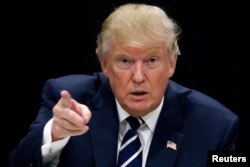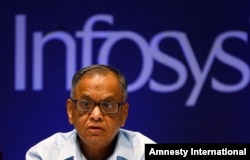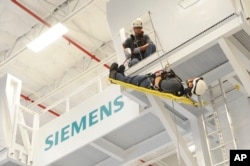When Michael Emmons found out he was losing his job as a software developer at Siemens technology company and being replaced by a foreign worker, the last thing he felt like doing was training his replacement.
But Emmons had more important factors to consider than his ego. He worked in a tough industry, and jobs were scarce. His young daughter had spina bifida, a disease that affects spinal cord development, and required expensive surgeries. His medical insurance bill was almost $1,000 per month.
"I wasn't going to put her health care at risk," Emmons said. "So I did what I had to do until I found another job."
Emmons agreed to train three replacements, each of whom learned a different aspect of his job. It took a lot of work — one of his trainees was so inexperienced that they had to resort to a basic "how to" manual for one of the most elementary functions of the trade.
Emmons had spent his own time and money to train himself on skills he needed to stand out. Now, not only was he forced to teach someone else those skills, he was training his replacements. "It was the most demoralizing thing I've ever been through," he said.
The 25 to 30 replacement workers at Emmons' Orlando, Florida, workplace came from India on L-1B and H-1B visas, just two out of approximately two dozen types of temporary visas that U.S. employers use to hire foreign workers.
Such guest worker visas are meant to provide a boost to the U.S. economy, especially the tech industry, by injecting skilled laborers into highly competitive fields to help complement the American workforce.
But critics say the system is in need of a massive overhaul, noting that U.S. employers regularly exploit loopholes to hire workers for lower wages, which hurts American workers like Emmons.
Trump signals changes
There are signs that the system may change under President-elect Donald Trump, who made tougher immigration policies a hallmark of his presidential campaign.
In a video Monday outlining his plans for his first 100 days in office, Trump said he will "direct the Department of Labor to investigate all abuses of visa programs that undercut the American worker."
Trump wasn't specific about what he would do if any abuses were found. But if he is looking to satisfy many supporters of his populist policies, he could start by making changes to the H-1B visa, the guest worker program that draws the most criticism.
Under the H-1B program, 85,000 workers and graduate students enter the U.S. each year, a limit set by U.S. law. The visas can last up to six years. Sometimes the guest workers go on to get green cards.
The goal of the program is to bring in specialized, highly skilled employees who aren't available in the U.S. But the problem is that many employers use the visa simply to hire workers with ordinary skills at a lower wage, explains Ron Hira, associate professor of public policy at Howard University.
"I'd say that more than half the visas are used to help facilitate the offshoring of U.S. jobs," said Hira, an expert on immigration and outsourcing. "And certainly more than half is used for cheaper labor — probably closer to 65 percent."
Just as concerning to Hira is that guest worker visas are tied to their employers, creating a sort of de facto indentured servitude that allows employers the ability to exploit foreign employees.
"Look — Infosys, Cognizant, even IBM are not hiring H-1Bs because these are specialized workers. It's because they're lower wage," he said.
Program fix
H-1B is very much on the radar of the people surrounding Trump.
"The people that are really versed on immigration policy that are at the very top of the Trump campaign and the people that are on his transition team have a very low regard for the H-1B program," said Roy Beck, president of Numbers USA, a Washington, D.C.-based group that works to reduce the number of emigrants to the U.S.
If Trump chooses to make big reforms to the temporary visa programs, he'll need the help of Congress. And there's a good chance he'll get it, according to Beck, who points out that the guest worker question does not fall along strictly partisan lines.
Fixing the problem wouldn't actually be that hard, according to Hira, who proposes the following: Raise wage requirement levels, making it more difficult for employers to hire cheap laborers; require employers to first recruit from U.S. worker pools; and implement a random audit system to ensure the program isn't being exploited.
But not everybody would be on board with those changes.
Alex Nowrasteh, an immigration policy analyst at the CATO Institute, says that raising the minimum salary requirement to $100,000 a year, as some have proposed, would dramatically shrink the program, hurting Silicon Valley and many other industries.
"The program has a lot of problems, a lot of things about it that need to be fixed, but it's better than having no program at all," Nowrasteh said, "because the contribution of skilled, migrant workers to the U.S. economy is pretty great."
For now, many of those currently in the U.S. on H-1Bs are on edge, wondering if any changes could affect their visa status.
"It is a worry, yes, as my visa will need renewed in 2018," said Alison, an Irish citizen who works for a D.C.-based nonprofit group and who declined to give her last name.
As for Emmons, after training his replacements at Siemens in 2002, he went on to get a new job — and now works as IT director for a local government office in Orlando, Florida. Perhaps it's no surprise that he supported Trump in the presidential election.
"We made a lot of noise back then, but not until Donald Trump came in do we actually feel that they're going to actually do something to help American workers," he said.
VOA’s Svetlana Cunningham contributed to this report.







